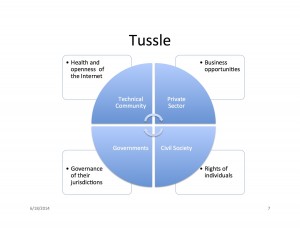“Internet governance” is one of those catchy phrases that people bandy about with the knowing assurance that everyone knows what is under discussion — or with a view to ensuring that crispness and clarity remain elusive. The Internet is not random, nor even particularly chaotic: there have been elements of Internet governance since the inception of the network.
The reality is that governance (as in management) of the Internet has existed and evolved to meet the needs of the Internet as it has developed over the last four and a half decades. This started with the need to have (open) standards for interoperable networking and agreed norms for acquiring and using parameters in those protocols. It evolved as availability of some of those parameters (IPv4 addresses) was inadequate for expected needs, especially given the original sizes of grants in allocation.
Even before the “g” in “Governance” started being capitalized, the Internet community organized itself to have a global, yet regionalized, system for open development of formally implemented policies for management of IP address allocation. Let me say that more directly. Problem: handing out chunks of address space was wasteful and leading to rapid runout of IPv4 addresses. Solution: the Internet community built bottom-up, open policy development institutions to manage the equitable allocation of the addresses that remained. That worked so well that the deployment of the successor protocol with a massive address space (IPv6) was deferred for a decade.
While this approach to identifying and addressing problems for the Internet has worked well for those involved in developing the Internet, it’s not such a comfortable (recognizable, formal, predictable, <fill in the blank as you like>) for those who are on the outside looking in. And those are the people who are increasingly impacted by the Internet and its use: governments, law enforcement agencies, other businesses. These worlds are colliding.
I explored that concept and others when, in June, I gave a lecture for the Norwich University Residency Week conference. I’ve posted my slides for the talk on my Publications page (See: 20140618-NorwichResidencyWeekInternetGovernance-cc).
The 3 key concepts of the presentation were:
- Internet governance sparks fly when worldviews collide — as described above.
- The Internet knows no physical boundaries — it wasn’t built with a view to following national or jurisdictional boundaries. Imposing rules and regulations on it forces an unnatural network topology with unhealthy side effects
- Internet governance should not only be about regulating technology and its use — for example, solving issues with abuse of “intellectual property rights” is more about getting agreement on what intellectual property is and how it should be handled than it is anything to do with networking.
As alluded to above, the definition of Internet governance (or Governance) has evolved over time.
- Making the Internet work through responsible construction and sharing
- Original definition
- Still see sparks of it – collaborative discussion of best paths forward in network architecting and operation
- Code for “management of critical Internet resources on a global basis”
- International struggle to control the domain name system and/or IP addresses
- Can the US pull the plug on a country’s Internet?
- No
- Country code domain name (e.g., .br for Brazil) relies on the DNS root zone file
- Physical world governance meeting and incorporating the Internet and its uses
- As the Internet becomes increasingly part of our lives, it’s hard to separate “governance of the population” from the Internet
The Internet was not designed as a single-purpose, coherent network – it doesn’t even notice national boundaries. That, in fact, is what gives us much of what we love about it. So, increasing regulation of the wrong things could break what we love.
- Forcing networks to line up on national boundaries
- Regulating the Internet when really it’s some service that you wanted to focus on (e.g., “telephony”)
At the same time, there are key issues that need regulation in order
to foster an orderly future for all. So, we all need to address the tussles when worlds collide, and figure out how to do it right.

